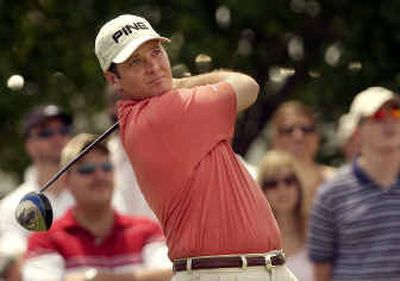Nationwide pointless?

Awarding world ranking points to the Nationwide Tour sure seemed like a good idea at the time.
The Nationwide might be the equivalent of the minor leagues, but some consider it the third-strongest golf circuit in the world. When Tim Petrovic won last month in New Orleans, that gave alums 163 victories on the PGA Tour.
“It does the Nationwide Tour a world of good to be in the world ranking system,” said Andy Pazder, vice president of competition for the PGA Tour. “It adds to the credibility.”
But it’s killing guys like Joe Ogilvie and Ted Purdy.
The ranking is important this week because the top 50 in the world after the St. Jude Classic are exempt from qualifying for the U.S. Open.
Ogilvie is No. 55. Purdy is at No. 64.
Neither of them is playing in Memphis, Tenn., and both will have to go through 36-hole qualifying.
The answer for getting into big events has always been to play better, and that’s still the case. But what hurts these two players in particular – and undoubtedly more down the road – is being saddled with Nationwide Tour events that remain on their ranking record for two years.
Wipe out the 15 times Ogilvie played on the Nationwide Tour the final five months of the 2003 season, and he would be No. 36 in the world. Do the same for Purdy, who has 19 Nationwide events on his ranking record, and he would move up to No. 40.
Hello, Pinehurst!
“I wish they wouldn’t give the Nationwide Tour any points,” Purdy said Tuesday. “Because it kills us when we start making (PGA Tour) points. It’s like a sophomore curse.”
The world ranking is really not that difficult to figure out.
Players are awarded points depending on their finish, with the amount of points determined by the strength of field. The points are doubled, then devalued by 25 percent every 13 weeks over a two-year period, and divided by the number of tournaments played over those two years.
Nationwide ranking points are a pittance, but each event counts as it were the Masters.
Ogilvie saw the ramifications early.
Assured of getting his PGA Tour card by finishing in the top 15 on the Nationwide money list in 2003, Ogilvie sat out the final four weeks and considered skipping the Nationwide Tour Championship.
“They were going to kill me going forward,” Ogilvie said. “If you’re guaranteed a card, you’re doing yourself a disservice by playing the Nationwide if you think you’re going to be good enough to be in the top 50 in the world. Obviously, I’d be better off if there were no world ranking points for the Nationwide.”
They’re not alone.
Mark Hensby and Zach Johnson, both of whom won on the PGA Tour last year, also have 16 Nationwide events dragging down their ranking. Both are inside the top 50, however, so it won’t keep them from the U.S. Open.
Disney winner Ryan Palmer, Reno-Tahoe Open champion Vaughn Taylor and Bo Van Pelt all are outside the top 100, and would be 30 to 40 spots higher if not for their Nationwide tournaments.
The advantages are rare.
Johnson did so well on the Nationwide Tour in 2003 – two victories, two second-place finishes – that he started his rookie season in the big leagues at No. 207 in the world. After two good finishes in Florida and a victory in the BellSouth Classic, he moved up No. 49 and eventually was eligible for the U.S. Open and a World Golf Championship.
Still, it is doing more harm than good, and it raises an important question.
Why does the Nationwide Tour need any ranking points?
The purpose of the Nationwide is not to climb the world ranking, but to earn enough money to get on the PGA Tour.
Plus, Nationwide points are virtually meaningless. The winner gets three points – same as the Asian and Canadian tours – while Vijay Singh received 34 points for winning the Wachovia Championship.
The tour’s solution is to beef up the points. It will propose in July increasing Nationwide ranking points to a minimum of eight for the winner, on par with Japan and Australia.
Some good that will do.
“If you win every (Nationwide) tournament, what’s the best you’ll be, 100th in the world?” Purdy said.
Actually, winning three times on the Nationwide earns a player an automatic promotion to the big leagues, which is all anyone wants. So, it’s a moot point.
“It’s a tough give-and-take,” Ogilvie said. “It’s better for the Nationwide Tour’s perception to have world ranking points. But if you give them more, and a guy gets into the top 60, is that fair when he hasn’t played against top competition?”
Ogilvie’s solution is to devalue the Nationwide events played – also known as the divisor – the same way points are gradually reduced. That way, it wouldn’t hurt a player in his second year as he chases exemptions to majors and World Golf Championships.
Ogilvie is not playing Memphis because he’s moving into a new house, has to put the other one up for sale and wants to give his wife a break from their two young children. Purdy needs a week off after playing 10 in a row.
Both will go to Memorial, then it’s off to U.S. Open qualifying.